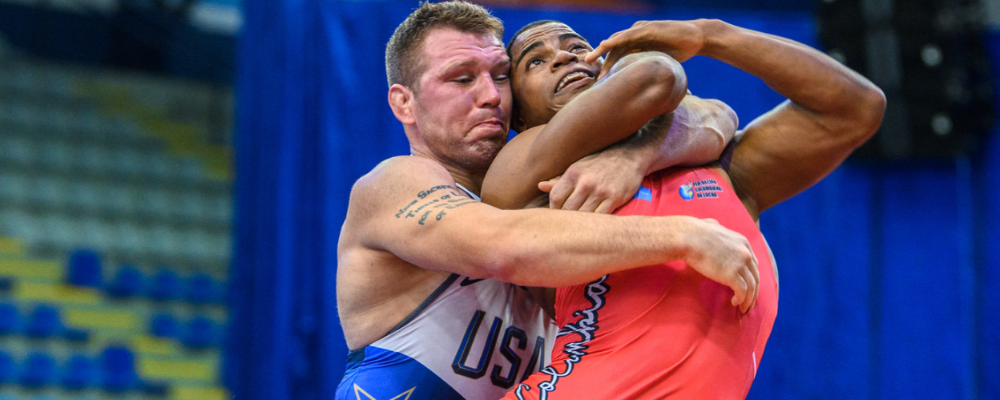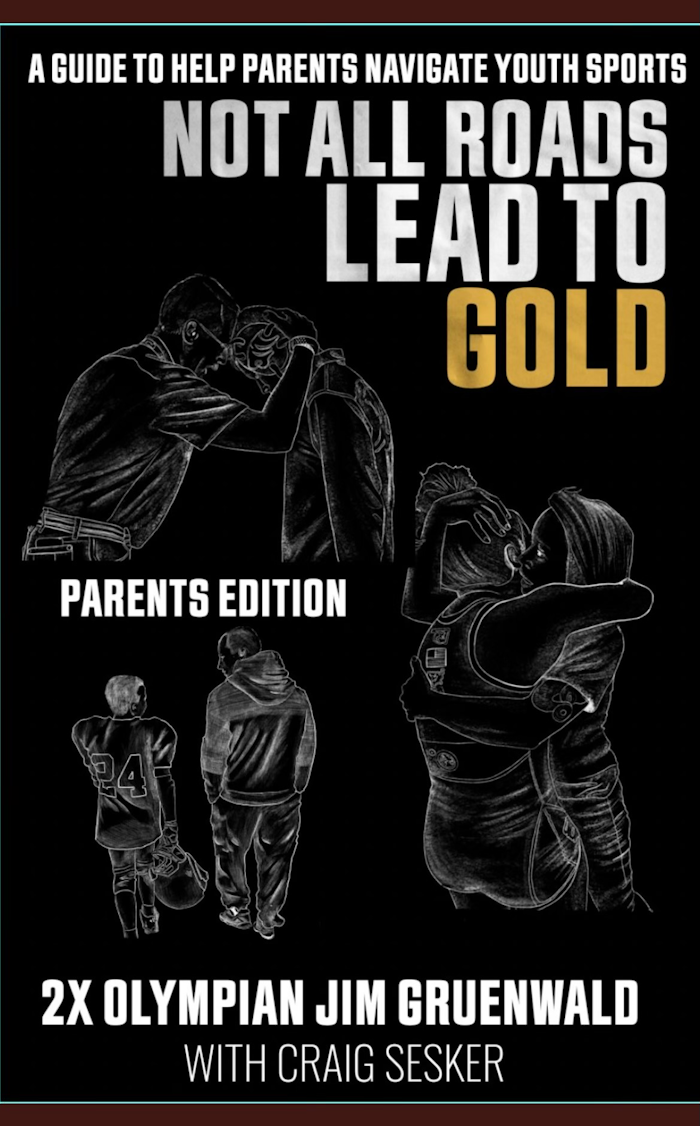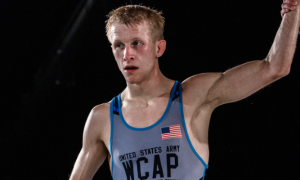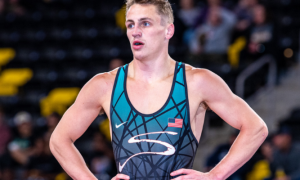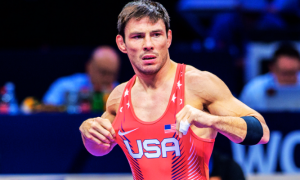On Saturday, Dalton Roberts (60 kg, Army/WCAP), Alex Sancho (67 kg, Army/WCAP), and John Stefanowicz (87 kg, Navy WC) each earned for themselves an impressive piece of hardware to add to their respective collections — bronze medals from the Military World Championships. ’22 National titlist Britton Holmes (77 kg, Army/WCAP) had a fine tournament, as well, and just missed out on the podium after finishing fifth.
The pseudo-annual tournament is often overlooked in the United States for what are, perhaps, various reasons. Timing is part of it. Most often, Military World events — run by CISM (the International Military Sports Council) — either follow or coincide with the string of United World Wrestling championship tournaments held each year. Once the fall arrives in America, most wrestling fans begin to focus on NCAA and high school folkstyle, thus dissipating their interest in international competition. Another is the coverage, or lack thereof. When the US hosted the event in ’14, the National Governing Body (USA Wrestling) put the proper network infrastructure in place to provide a live stream; in the years since, the tournament has by and large been shrouded in mystery, save for photos of matches or clips posted by athletes and coaches on social media. CISM cedes control of the event to the national federations on whose soil the event is hosted; some countries have been prepared to treat these tournaments as major World-level showcases, and some have not. Because UWW takes a backseat in how CISM tournaments are presented, the standard of coverage and information-sharing is akin to a sliding scale.
In ’23, other factors were evident. Several nations decided to forgo sending contingents due to Russian and Belarusian wrestlers becoming permitted to compete; since there is no escaping that these athletes are directly representing their countries, they could not enter under the “Individual Neutral Athlete” tag (or AIN) that had been imposed earlier this year by the International Olympic Committee and every other sports sanctioning body. UWW also pulled the event from their webpage calendar; and, in general, host nation Azerbaijan fell woefully short of presenting to a potentially vast global audience the breadth of coverage that is normally associated with a competition of this magnitude — surprising, if only because wrestling is Azerbaijan’s national sport. To that point, by all accounts the arena was full for each session. It is just that very few outside of the arena were aware of that fact.
But one element that cannot and should not be misunderstood is the level of wrestling itself. The CISM Military World Games or Championships (depending on the year) routinely features many of Greco-Roman’s top performers. The brackets for each weight category at CISM may not boast the same numbers as are witnessed in UWW tournaments, but that is precisely why the tournament delivers such a challenge. Competition is condensed; therefore, bypassing difficult match-ups against other elite wrestlers — especially in Greco-Roman — is not an option. Americans who participate in the CISM World Military Championships are practically guaranteed to face a scope of talent that is on par with what they would encounter at a UWW World tournament.
Aftermath
While the official update is set for inclusion in the forthcoming Monday Roundup, all four Americans who competed in the ’23 CISM World Military Championships will see an adjustment to their 5PM USA Greco-Roman ranking points. Bronze medalists Roberts (5PM #2 at 60 kg), Sancho (5PM #1 at 67 kg), and Stefanowicz (5PM #8 at 87 kg) will all receive 20 points due to the event’s status as a Tier 1 International tournament, while Holmes (5PM #5 at 77 kg) will collect 15. Their respective ranking orders are unlikely to change since domestic head-to-head data was obviously unaffected by their performances. The Nationals in two weeks is poised to impart the biggest influence in this regard.
Sancho & Stefanowicz
The four American competitors were reached for comment on Saturday following the tournament. Roberts’ dialogue was included in the primary recap. Holmes — for whom transparency is a hallmark — declined to provide a substantive response and instead preferred to shoot back “No comment”. Holmes is a notoriously devoted, if not downright vicious competitor, and so his decision to bypass making an on-the-record statement is both embraced and understandable.
Below are the answers from Sancho and Stefanowicz, who were teammates on the ’20 US Olympic roster. Sancho was concise with his texted replies, which for him were submitted past midnight local time. Stefanowicz — who also competed at the CISM Worlds in ’17 — delivered the most insights, something he did regularly prior to the wrongful dissolution of the All-Marine Team. All four USA athletes were provided the same questions; for the sake of a more consumable format, the answers to the questions from both are presented together.
5PM: How did you feel physically today and what was working for you?
Alex Sancho: I felt strong and physically in good shape. I believe that I’m one of the stronger and bigger athletes at 67 kilograms if I manage and cut my weight well.
John Stefanowicz: Physically, the competition had its own set of friction points with the schedule of bouts often being unforeseen. As a collective group, we each had a match game-plan to stick with throughout the day — and took pieces from each match and built on them. The expectation among us was wrestling to get on the podium from the beginning of the week. The mistakes made in the semis were addressed and, when executed again, the result paid off how the coaches and I anticipated.
5PM: What is it like wrestling in this tournament?
Sancho: It was a very eye-opening experience because the stands were packed with wrestling fans and the tension of competing to the death for your country was there. Nerves were there, but they were in control and I competed to the best of my ability one match at a time.
Stefanowicz: CISM events are always a spectacle. It’s an opportunity for a nation’s military to add as much pizazz to a sporting event as possible while making it intimate and more meaningful than your typical World Championship. The stands were packed full every day before we arrived, and they remained that way until every medal was awarded. It is the type of atmosphere you want to perform in.
5PM: What is recovery going to look like for you as the Nationals approach?
Sancho: Recovery is going to be good. I’m already on-weight and prepared for the US Open.
Stefanowicz: I have to take a handful of days this week to make up for days lost military obligations. But after that, the focus can come back before Nationals. I think all of the athletes are going to use this as a really great tune up before Nationals.

Listen to “5PM54: WCAP’s Ryan Epps and a Final X Greco-Roman Preview” on Spreaker.
SUBSCRIBE TO THE FIVE POINT MOVE PODCAST
iTunes | Stitcher | Spreaker | Google Play Music


